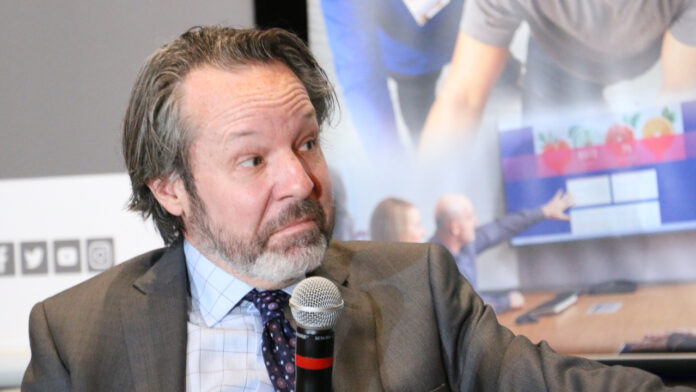
The COVID-19 pandemic, and its effects on the health care system and life in general, was again the primary topic of the CBJ’s 2022 Health Care Summit held this morning at the Hyatt Regency Coralville Hotel & Conference Center.
Two years into the pandemic, the numbers of cases and hospitalizations are declining, but its continuing toll needs to be addressed, said David Stoltz, professor of Internal Medicine-Pulmonary, Critical Care and Occupational Medicine, at University of Iowa Health Care, during a question-and-answer session.
“I’m sort of an optimistic person so, I’m hopeful that things are moving in the right direction,” said Dr. Stoltz, who is trained as a lung doctor and ICU physician. “I think we’ll get to it, but I don’t think we’re to the magic stage of endemic yet.”
“I think if you speak to the epidemiologists, the infectious disease experts, what they are saying now is they’re not making any more predictions. At every turn, the virus has made us realize that we’re not in control, and it’s doing some unique things that we have not seen other respiratory viruses do. That being said, all pandemics end.”
While he didn’t name a specific country that has handled the pandemic particularly well, he did give high praise to the Iowa City area.
“Maybe not so much with Omicron because I think we were all overwhelmed, but generally speaking, I think I was impressed with how we as a health care community had resources available and had these clinics to follow up with and monitor people as they were actively infected with COVID,” he said. “Not to toot the city’s own horn, but I think we did a pretty good job with it.”
But health care workers are “just exhausted” from the physical and emotional stress associated with the pandemic, he added.
“We’ve also seen a huge number of people leave the health care profession, so those that have stayed are under increased additional stress and burden. An ICU nurse is not something that you can train in a couple months,” he said. “We’ve had people with 10-20 years of experience who have moved into other areas of the health care sector or leave the profession altogether. We have many health care professionals who can’t take vacation because of the lack of people.”
On the flip side, medical school admissions have gone up significantly as people want to make an impact despite the obvious stresses of the occupation.
“The biggest message is that it’s getting better. I think we’ve learned so much about this virus,” he said of the lingering pandemic. “It’s a testament to the scientific and medical communities in terms of what they’ve done. The ability to make a vaccine in less than a year and one that is as effective as it is, really it’s amazing. We’re learning how to live with this virus because at the end of the day, that’s what we’re going to have to do.”




